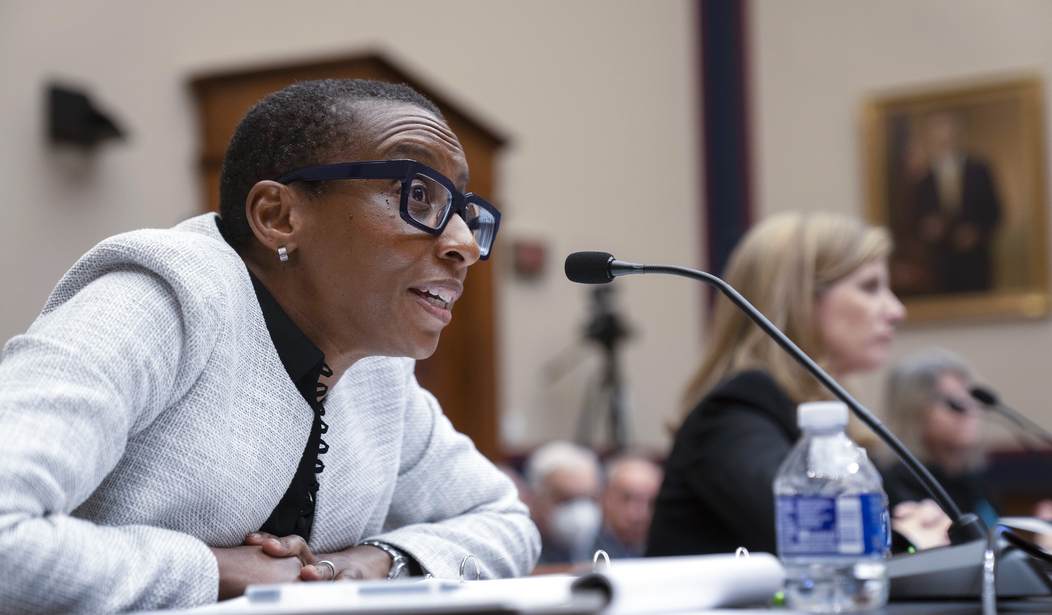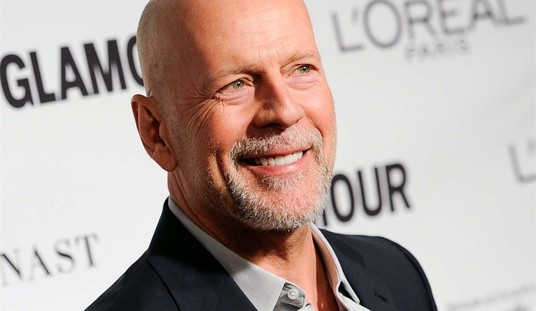After the past week's Congressional hearings, the presidents of Harvard University, the Massachusetts Institute of Technology, and the University of Pennsylvania are being exposed to an amount of publicity and scrutiny they're not used to and likely wish would go away. As we reported, the trio claimed that calls for genocide against Jews needed to be placed into context before deciding whether they violated student codes of conduct.
The backlash was swift, and so was the backpedaling.
WATCH: Here Comes the Groveling Apology Video From Penn President Liz Magill
UPenn's Liz Magill wasn't able to keep her job, though, and Harvard's Claudine Gay might not be far behind.
Gay has already had a rough tenure, as investigative journalist Chris Rufo writes:
As dean and then president, Gay has been accused of bullying colleagues, suppressing free speech, overseeing a racist admissions program, and, following the Hamas terror campaign against Israel, failing to stand up to rampant anti-Semitism on campus.
Now Rufo has presented documentation indicating that Gay might have plagiarized parts of her Ph.D. dissertation, which violates Harvard's policies on academic integrity. He tweeted:
First, Gay lifts an entire paragraph nearly verbatim from a paper by Lawrence Bobo and Franklin Gilliam’s, while passing it off as her own paraphrase and language. This is a direct violation of Harvard's policy: "When you paraphrase, your task is to distill the source’s ideas in your own words. It’s not enough to change a few words here and there and leave the rest; instead, you must completely restate the ideas in the passage in your own words. If your own language is too close to the original, then you are plagiarizing, even if you do provide a citation."
Gay repeats this violation of Harvard's policy throughout the document, again using work from Bobo and Gilliam, as well as passages from Richard Shingles, Susan Howell, and Deborah Fagan, which she reproduces nearly verbatim, without quotation marks. pic.twitter.com/K75YPeZwky
— Christopher F. Rufo ⚔️ (@realchrisrufo) December 10, 2023
Then, according to Rufo, "Gay appears to lift material from scholar Carol Swain." He tweets:
Second, Gay appears to lift material from scholar Carol Swain. In one passage, summarizing the distinction between "descriptive representation" and "substantive representation," she copies the phrasing and language nearly verbatim from Swain’s book 'Black Faces, Black Interests,' without providing a citation of any kind.
Later in the paper, Gay also uses identical language to Swain, without adding quotation marks, as required. "Since the 1950s the reelection rate for House members has rarely dipped below 90 percent," reads Swain’s book, which is the same, excepting an added comma, to the language in Gay’s dissertation: "Since the 1950s, the reelection rate for incumbent House members has rarely dipped below 90%."According to Harvard’s rules, this would be a violation of the policy on "inadequate paraphrase," which requires that verbatim language be placed in quotations.
Later in the paper, Gay also uses identical language to Swain, without adding quotation marks, as required. "Since the 1950s the reelection rate for House members has rarely dipped below 90 percent," reads Swain’s book, which is the same, excepting an added comma, to the language… pic.twitter.com/p6aM8776Hh
— Christopher F. Rufo ⚔️ (@realchrisrufo) December 10, 2023
Gay also paid homage to her dissertation advisor, Gary King, according to Rufo.
Third, Gay composes an entire appendix in the dissertation directly taken from Gary King's book, 'A Solution to the Ecological Inference Problem.' While she cites King’s book later in the appendix—in fact, King was her dissertation advisor—Gay does not explicitly acknowledge that… pic.twitter.com/WGZAzc6gUn
— Christopher F. Rufo ⚔️ (@realchrisrufo) December 10, 2023
Gay does not explicitly acknowledge that Appendix B is entirely grounded in King’s concepts and language, instead passing it off as her own original work.
As Rufo writes, "these are flagrant violations of Harvard's plagiarism policy." While lifting full sentences or paragraphs is obvious plagiarism, paraphrasing the work of another without acknowledging the source is also a no-no. The section of Harvard's plagiarism policy titled "uncited paraphrase" reads:
When you use your own language to describe someone else's idea, that idea still belongs to the author of the original material. Therefore, it's not enough to paraphrase the source material responsibly; you also need to cite the source, even if you have changed the wording significantly. As with quoting, when you paraphrase you are offering your reader a glimpse of someone else's work on your chosen topic, and you should also provide enough information for your reader to trace that work back to its original form. The rule of thumb here is simple: Whenever you use ideas that you did not think up yourself, you need to give credit to the source in which you found them, whether you quote directly from that material or provide a responsible paraphrase.
These are flagrant violations of Harvard's plagiarism policy, which states that students who commit plagiarism will suffer "disciplinary action, up to and including requirement to withdraw from the College." The same standard should apply to the university president. pic.twitter.com/Q2UviANylT
— Christopher F. Rufo ⚔️ (@realchrisrufo) December 10, 2023
Rufo contacted Gay for comment prior to publishing his story, but she did not respond.















Join the conversation as a VIP Member